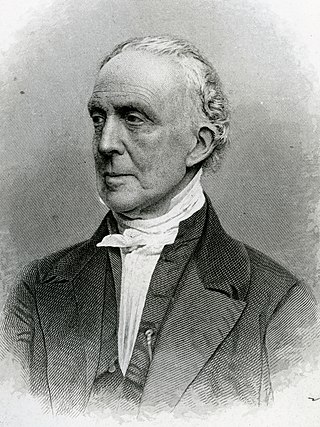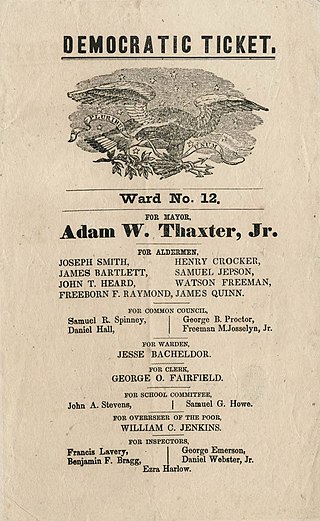| |||||||||||||||||||||
| |||||||||||||||||||||
| |||||||||||||||||||||
The December 1845 Boston mayoral election saw the election of Whig Party nominee Josiah Quincy Jr. It was held on December 8, 1845. [1]
| |||||||||||||||||||||
| |||||||||||||||||||||
| |||||||||||||||||||||
| Elections in Massachusetts |
|---|
 |
The December 1845 Boston mayoral election saw the election of Whig Party nominee Josiah Quincy Jr. It was held on December 8, 1845. [1]
| Party | Candidate | Votes | % | |
|---|---|---|---|---|
| Whig | Josiah Quincy Jr. | 5,333 | 63.25 | |
| Know Nothing | William S. Damrell | 1,647 | 19.54 | |
| Democratic | John T. Heard | 1,354 | 16.06 | |
| Scattering | Other | 97 | 1.15 | |
| Total votes | 8,431 | 100 | ||
Quincy's majority over Know-Nothing nominee Darrell led The Boston Post to run the headline "Nativeism deceased of the Quincy". [2] The Whig Party overwhelmingly triumphed in the other coinciding municipal elections. [5]

Josiah Quincy III was an American educator and political figure. He was a member of the U.S. House of Representatives (1805–1813), mayor of Boston (1823–1828), and President of Harvard University (1829–1845). The historic Quincy Market in downtown Boston is named in his honor. A panel of 69 scholars in 1993 ranked him among the ten best mayors in American history.

Thomas Aspinwall Davis was a silversmith and businessman who served as mayor of Boston for nine months in 1845.
The Boston mayoral election of 1895 occurred on Tuesday, December 10, 1895. Democratic nominee Josiah Quincy defeated Republican incumbent mayor Edwin Upton Curtis and one other contender to win election to his first term.
The Boston mayoral election of 1854 saw the reelection of incumbent mayor Jerome V. C. Smith. It was held on December 11, 1854.
The Boston mayoral election of 1855 saw the election of Alexander H. Rice. It was held on December 10, 1855.
The Boston mayoral election of 1856 saw the reelection of Alexander H. Rice. It was held on December 8, 1856.
The Boston mayoral election of 1858 saw the reelection of Frederic W. Lincoln Jr. It was held on December 13, 1858.
The Boston mayoral election of 1859 saw the reelection of Frederic W. Lincoln Jr. to a third consecutive term. It was held on December 12, 1859.

The 1856 Massachusetts gubernatorial election on November 4. Incumbent Know-Nothing governor Henry J. Gardner was re-elected to a third term. He benefited greatly from a deal with the state's new Republican Party, which agreed not to field a candidate in exchange for Gardner's support of presidential nominee John C. Frémont. With no serious challenger in the field against him, Gardner easily defeated Democrat Erasmus Beach and George W. Gordon, an American Party member running in support of the national ticket.
The Boston mayoral election of 1853–1854 saw the election of Citizens Union Party nominee Jerome V. C. Smith. The election took three votes, as no candidate secured the needed majority in the first two attempts. Incumbent Whig mayor Benjamin Seaver had run for reelection as his party's nominee in the first vote, but opted not to compete in the second or third votes.

The 1851 Boston mayoral election saw the election of Benjamin Seaver, a former president of the Boston Common Council, as mayor of Boston. The election took three votes, as no candidate secured the needed majority in the first two attempts. In the third attempt, Seaver won the required majority by the margin of a single vote. Incumbent Whig mayor John P. Bigelow was not a nominee for reelection.
The 1849 Boston mayoral election saw the reelection of incumbent Whig mayor John P. Bigelow. It was held on December 10, 1849.
The 1848 Boston mayoral election saw the election of Whig Party nominee John P. Bigelow. It was held on December 11, 1848. Incumbent Whig mayor Josiah Quincy Jr. was not a nominee for reelection.
The 1847 Boston mayoral election saw the reelection of Whig Party incumbent Josiah Quincy Jr. to a third consecutive term. It was held on December 13, 1847.
The 1846 Boston mayoral election saw the reelection of Whig Party incumbent Josiah Quincy Jr. It was held on December 14, 1846.
The 1844–45 Boston mayoral election saw the election of Native American Party nominee Thomas Aspinwall Davis as mayor of Boston. The election took eight votes, as no candidate secured the needed majority in the first seven attempts. Incumbent Whig Party mayor Martin Brimmer was not a nominee reelection.
The 1843 Boston mayoral election saw the reelection of Whig Party incumbent Martin Brimmer. It was held on December 11, 1843.
The 1842 Boston mayoral election saw the election of Whig Party nominee Martin Brimmer. It was held on December 12, 1842. Whig Party incumbent Jonathan Chapman was not a nominee for reelection.
The 1841 Boston mayoral election saw the reelection of Whig Party incumbent Jonathan Chapman to a third consecutive term. It was held on December 13, 1841.
The 1836 Boston mayoral election saw the election of Whig Party nominee Samuel Atkins Eliot. It was held on December 12, 1836. Incumbent Samuel T. Armstrong was not a nominee for reelection.